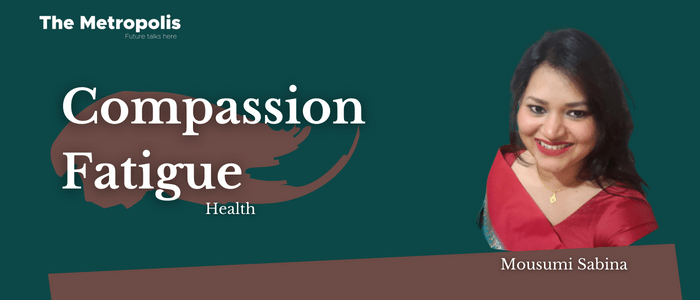When we say how to deal with “Compassion Fatigue”, we need to know what it is, or how it happens. Who is more susceptible to this type of fatigue?
It is unnatural to show love and care for others for a long time without taking self-care. When we feel extremely tired from taking care of someone, we experience burnout, not because we are exposed to trauma but because we are dealing with someone else’s trauma. What thought does come across our mind when we hear the word “compassion”? We think of it as an empathetic way of showing love and care when someone is in distress and needs support. But being empathetic and helping others in their difficult times for a long time can lead to fatigue which is known as compassion fatigue. People in the healthcare system, such as doctors, nurses, emergency service providers like fire workers, mental health service providers, teachers, and lawyers, are more likely to be exposed to this kind of fatigue.

Let us imagine a few situations:
Imagine you are visiting a doctor’s chamber with a serious illness and are waiting for long hours to meet the doctor. Once your turn comes in, you see the lack of connectedness between the doctor and you. To put it another way, even if the doctor is trying to listen to you to be empathetic, he or she may seem overwhelmed and withdrawn.
Again, imagine how many times we read the news of negligence by law enforcement agency members in addressing serious issues immediately although they are intended and trained to respond to emergencies. They are often found overwhelmed or stressed with many other serious issues without even realizing the importance to respond to a new one. In both situations, it is quite natural to infer that they are not empathetic enough to understand and respond appropriately and provide support.
Prolonged exposure to trauma and distress makes some people less empathetic, and emotionally disconnected and they suffer from secondary trauma. They do not directly experience trauma but listen to or watch others’ trauma experiences a lot. They often neglect their self-care and struggle with the images and stories they cannot forget. They suffer from the symptoms of compassion fatigue, which are the same as those of fatigue, including headaches, emotional disconnectedness, numbness, stomach upset, anxiety, etc. People who are dedicated and work for others often neglect their self-care to support others. They can get compassion fatigue from a single case of trauma or accumulated exposure to trauma.
Now, let us dig into where the term came from. Historian Samuel Moyn said “Compassion fatigue is as old as compassion” but the term was coined by historian Carla Joinson in 1992, and further defined and researched by psychologist Charles Figley, who described it as “a state of exhaustion and dysfunctions, biologically, physiologically and emotionally, as a result of prolonged exposure to compassion stress”.
What measures can limit such kind of fatigue? The first initiative to prevent these types of fatigue, which might lead to severe mental health issues (if untreated), is to create awareness. Arranging regular awareness programs, and relaxation sessions can be very effective in this respect. Prevention is better than cure, hence taking enough rest, consuming healthy food, and doing regular exercise can be good ways to deal with this type of fatigue. Self-care can reduce the symptoms but cannot cure them completely.
Last but not the least, being a Certified Practitioner of Psychodrama, Sociometry, and Group Psychotherapy, I would like to recommend finding and joining group sessions to process that secondary trauma. Group sessions can be very helpful in learning how to set healthy boundaries in their personal and professional life. Professional supervision of psychologists or psychotherapists can also reduce the risk of compassion fatigue. Also, regular mindfulness practice, yoga, and meditation can improve emotional health to deal with compassion fatigue.
(Mousumi Sabina is a Bangladeshi Counselling Psychologist, M.Sc. and American Board of Examiners Certified Practitioner in Psychodrama, Sociometry and Group Psychotherapy. At present she resides in New York, USA)



